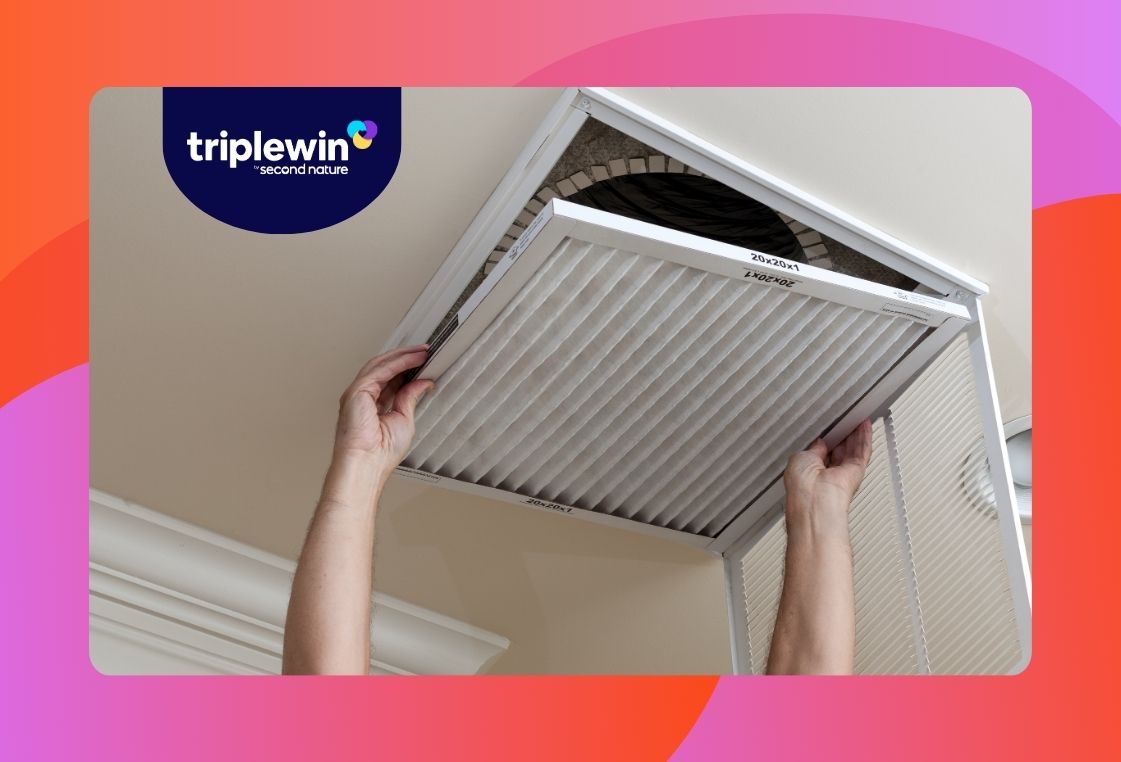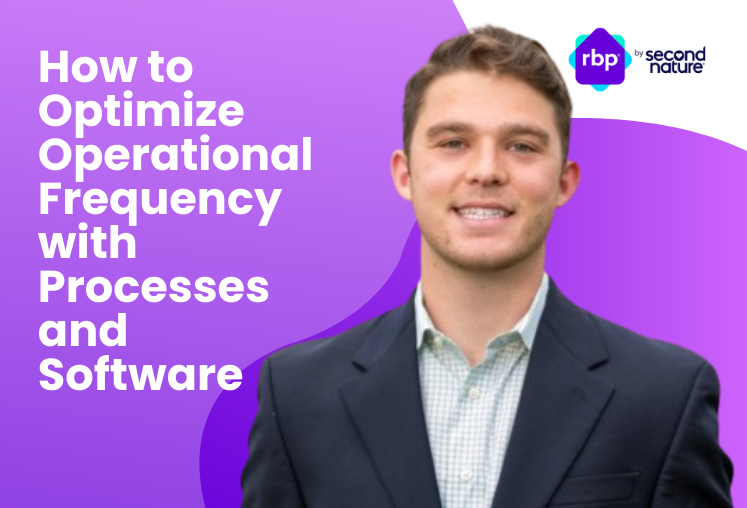For SFR property managers, HVAC maintenance costs can be a massive drag on your monthly expenses, but HVAC efficiency is critical to resident's safety, health, and overall experience. Not to mention the longevity of the properties you manage.
Can property managers reduce HVAC maintenance costs and extend the life of their HVAC systems?
Welcome to our latest in-depth analysis, "How to Reduce HVAC Maintenance Costs.” Our analysis comes from a collaborative study by the National Rental Home Council and Second Nature. The study examined the effectiveness of Second Nature’s filter delivery program in preventing HVAC-related work orders for SFR portfolios.
As we delve into the study, you'll discover fresh insights that can help you make your HVAC system not only more efficient but also more cost-effective. Gain an understanding of preventative measures and strategic practices to lower your maintenance expenditure and prolong your HVAC system’s lifespan.
Tune in and save your investor’s money, your team’s time, and your resident’s comfort. That’s what we call a Triple Win!

Impact of Optimized HVAC Filter Delivery Service on Maintenance Costs
The National Rental Home Council conducted an 18-month study in partnership with Second Nature, analyzing 7,700+ SFR units to evaluate the effectiveness of Second Nature’s Filter Delivery Service. The data was sourced from Property Meld and Service Titan.
Filter Delivery is one of the major pillars of Second Nature’s first-of-its-kind Resident Benefits Package. Filter delivery service helps maintain the lifespan of your HVAC system and boost energy efficiency. This reduces the need for maintenance services and the average cost of energy bills and increases the air quality of your homes.
Here’s how the study worked – and the findings on the total impact for property managers, residents, and investors.
HVAC Study - Methods
The study analyzed data for the frequency of resident HVAC service requests as a percentage of total units, with and without HVAC filter delivery. The frequency of tickets with and without delivery services was used to determine the overall reduction in HVAC problems and service requests.
The study was conducted over 18 months, surveying 7,772 units. Filters that required complete change-out were delivered every 60-90 days and date-stamped. Each filter delivery contains graphic instructions to help the resident make the swap themselves.
In addition to sending the filters, Second Nature sent residents emails with tracking info and more information on safe installation. Second Nature also provides property managers with lease language and marketing language for listings and applications and renewal notices. The property management company’s name and logo are stamped on the box with messaging about energy savings.
HVAC Study - Overall Findings Include 38% Reduction in HVAC Ticket Requests
The study found that for those units that had filter delivery service, there was a total reduction of nearly 40% of HVAC ticket requests.
Across four separate operators, the percentage decrease in HVAC ticket requests ranged from 31%, 37%, 42%, and 50%.
Here’s a breakdown of cost reduction in two major cities from the study:
- Atlanta: 79% cost reduction
- Memphis: 32% cost reduction
Other observations and conclusions:
- The EPA states that changing filters regularly results in a 5-15% reduction in monthly heating and cooling bills.
- All operators from the study enroll residents as part of a Resident Benefits package that saved residents money and delivers superior convenience to retail alternatives.
- The Resident Benefits Package by Second Nature yields an average of $156 per year in gross profit per home before operational costs.
- All four operators from the study enrolled 85-100% of eligible leases and renewals over the 18-month period.

Tips to Reduce HVAC Maintenance Costs for Property Managers
HVAC service costs are increasing year over year. But the right package of services and maintenance plan can help reduce those costs.
For property managers who don’t have a Resident Benefits Package to do the work for them, we do have some general tips on how to reduce HVAC maintenance costs with regular maintenance.
These tips are best practices across the board for maintaining a top-notch heating and AC maintenance plan and are helpful even if you do have filter delivery as part of your suite of resident services. Of course, an RBP with filter delivery supports most of these already.
1. Regular Filter Changes
This is obvious, considering the topic we’re covering!
Dirty filters can restrict air flow, causing your HVAC system to work harder than necessary. Regular filter changes can improve system efficiency and reduce wear and tear. They also improve indoor air quality, which contributes to a healthier environment for occupants.
Refreshing filters on a regular cadence is critical for both maintaining an efficient HVAC system and protecting your resident’s health. By implementing automated filter delivery by Second Nature, you can rest easy that your residents aren’t falling behind on this critical task.
Regular filter changes also reduce the need for maintenance visits and cut down on any replacement costs or labor costs.
2. Schedule Preventative Maintenance & Tune-Ups
Routine maintenance is the first and one of the most essential steps toward reducing HVAC repair costs. Annual maintenance is standard, but regular check-ups ensure that the system is running efficiently and any potential issues are identified before they become costly repairs.
This can include cleaning the air filters, duct cleaning, checking for refrigerant leaks, and ensuring all components, like the compressor, condenser coils, evaporator coil, blower motor, capacitor, fan motor, drain line, heat exchanger, heat pump – the list goes on and on! – are in good working condition.
Most property managers conduct seasonal maintenance to check the air conditioning, refrigerants, etc., before summer or give a tune-up to the heating before winter.
Filter delivery is the simplest way to automate preventive care for your resident’s HVAC systems. Simply turn it on, and Second Nature does the work for you!
3. Invest in High-Efficiency HVAC System
Investing in high-efficiency HVAC units might require more upfront costs, but they pay off in the long run. These heating and AC units use less energy, reduce operational costs, and tend to require fewer repairs over their lifespan. They also provide a comfortable environment for occupants, increasing property value.
Filter delivery helps protect the lifespan of your high-efficiency units by preventing avoidable damage. The average costs of a high-efficiency heating or air conditioning system make sense for the return on investment.
4. Install Proper Insulation
Insufficient insulation can cause the HVAC system to overwork, leading to higher maintenance costs and reduced system lifespan. By ensuring your property is well insulated, you can help maintain indoor temperatures for your heating and air conditioner and reduce the strain on your heating and AC system.
5. Use Programmable Thermostats
Programmable thermostats allow for more precise control over temperature settings and scheduling. This can greatly reduce the burden on the HVAC system by avoiding unnecessary heating or cooling during off-peak hours or when the property is unoccupied. HVAC professionals can help with installation and maintenance, or you can train your team.
There are so many moving parts with heating and cooling systems, and having a programmable thermostat can reduce the complexity significantly.
6. Consider Ductless Systems
If feasible, consider using ductless HVAC systems. A new system like this can provide more direct heating and cooling without the energy loss associated with ductwork. This can reduce energy costs and result in less strain on the system, reducing maintenance needs.
7. Train Maintenance Staff for HVAC Service
Proper training enables your maintenance team to identify and solve minor problems before they escalate – or before a resident tries to DIY it!
A well-trained HVAC technician can also ensure that the system is correctly installed, operated, and maintained, thus extending its lifespan and reducing maintenance costs. You may not need to hire an HVAC contractor as often if your team knows how to handle day-to-day issues.
Of course, engaging a filter delivery service can help take a ton of the day-to-day work burden off your staff. Second Nature ensures your residents have fresh filters exactly when they’re needed. No more schlepping out for repair service calls every month. There will always be occasions when an HVAC expert or replacement parts are needed, but you can reduce tune-up costs and visits with good training on your own team.
8. Deploy Energy Management Systems
An energy management system can help monitor HVAC performance and identify areas for energy-saving opportunities. HVAC companies provide these at various price points. These systems provide real-time feedback, enabling property managers to make immediate adjustments that improve efficiency and save money.
9. Opt for Longer Warranties
While purchasing new HVAC equipment, consider opting for longer warranties. This small investment can cover many future HVAC repairs, saving you from unexpected maintenance costs down the line.
Again, using a filter delivery service works in tandem with longer warranties, too. Your systems will last longer, and the longer warranty will continue to cover any issues that do come up down the line.
10. Tenant Education
Lastly, educate your tenants about the correct use of the HVAC system. This can include setting reasonable temperature limits and explaining how to properly use programmable thermostats. Well-informed tenants can play a significant role in reducing unnecessary strain on the HVAC system.
A key part of Second Nature’s RBP is providing property managers with marketing and educational materials for their residents. We help you communicate to them the value of safe and effective HVAC systems. Again, we’re taking the work off your plate and making HVAC maintenance as easy as second nature!
Final Thoughts on HVAC Maintenance
Efficient HVAC management not only reduces costs but also fosters a comfortable living environment for residents. Each of the strategies outlined above contributes to these twin goals in its own unique way.
The best news, though? Execution of these measures can be significantly enhanced with the aid of a resident benefits package. As the HVAC Study outline above shows, you can cut HVAC ticket requests by up to 50% with a filter delivery service. That means savings for you, your residents, and your property investor.
In fact, a well-designed resident benefits package can support and streamline the implementation of many cost-saving property management strategies and reduce the need for emergency services. Ultimately, the smart combination of the tips provided above and a supportive resident benefits package is an excellent approach to reducing HVAC maintenance costs for property managers.
The resulting cost savings, increased system longevity, and enhanced resident satisfaction make this a worthwhile investment.
Topics:



